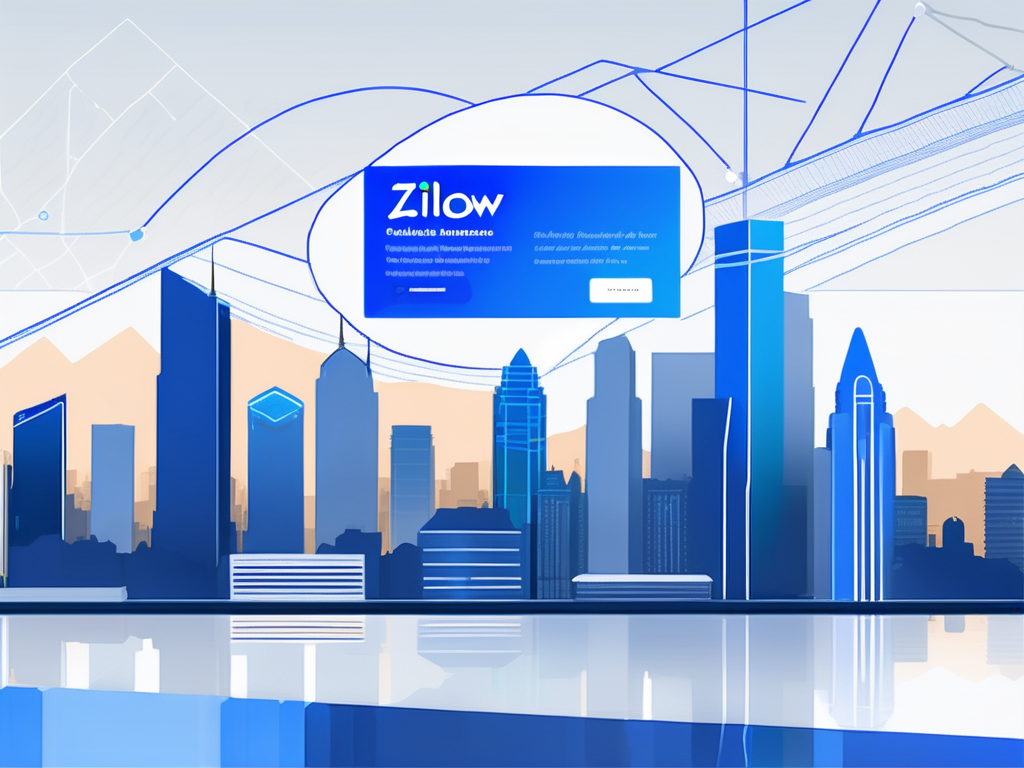The Future of Real Estate on Zillow: Adapting to Market Shifts; Embracing Digital Innovations


In recent years, the real estate industry has witnessed significant changes due to the rapid advancement of technology and shifting market dynamics. Zillow, a leading online marketplace for buying, selling, and renting properties, has played a pivotal role in shaping the future of real estate. By adapting to market shifts and embracing digital innovations, Zillow has gained a competitive edge and revolutionized the way people engage with the real estate market.
Understanding the Current Real Estate Landscape
Before delving into Zillow's role in the real estate industry, it's important to understand the current landscape. Technology has become an integral part of our lives, and the real estate sector is no exception. Buyers and sellers now rely heavily on websites, apps, and online platforms to search for properties, gather information, and make informed decisions. This shift has presented both challenges and opportunities for the industry, requiring players in the market to adapt and evolve accordingly.

The Role of Technology in Real Estate
Technology has transformed the way real estate transactions take place. Gone are the days when potential buyers would comb through newspapers or rely solely on real estate agents for property listings. Today, tools like Zillow have streamlined the process by providing a comprehensive database of properties at users' fingertips. This accessibility has empowered buyers and sellers to make more informed decisions, ultimately reshaping the traditional methods of property transactions.
Market Shifts and Their Impact on Real Estate
The real estate market is constantly evolving, influenced by various factors such as economic conditions, demographics, and social trends. Market shifts can significantly impact property prices, demand, and overall industry dynamics. For instance, the COVID-19 pandemic has accelerated the adoption of remote work, leading to increased demand for properties in suburban areas and a decrease in demand for urban properties. Adapting to these market shifts is vital for real estate companies to remain relevant and successful.
Furthermore, the real estate landscape is also shaped by changing consumer preferences and lifestyle choices. As society becomes more environmentally conscious, there is a growing demand for sustainable and energy-efficient homes. Homebuyers are increasingly seeking properties with features like solar panels, energy-efficient appliances, and green building materials. This shift in preferences has prompted real estate developers to incorporate sustainable practices into their projects, creating a more eco-friendly housing market.
In addition to environmental considerations, the evolving demographics of homebuyers also play a significant role in shaping the real estate landscape. As millennials enter the housing market, their preferences and needs differ from previous generations. They prioritize convenience, walkability, and access to amenities over larger living spaces. This has led to the rise of mixed-use developments, where residential units are combined with commercial spaces, creating vibrant communities that cater to the needs of this new generation of homebuyers.
Zillow's Adaptation to Market Shifts
Zillow has truly embraced the concept of adaptability, positioning itself as a market leader by responding proactively to changing market dynamics. Let's explore some of the strategies Zillow has employed to stay ahead of the curve.
In addition to expanding its range of services, Zillow has also focused on enhancing its user experience through innovative technology. By leveraging artificial intelligence and machine learning, Zillow has been able to provide personalized recommendations to users, making their property search more efficient and tailored to their preferences. This technological advancement not only sets Zillow apart from its competitors but also showcases its commitment to staying at the forefront of the real estate industry.
Strategies for Adapting to Market Changes
Zillow has recognized the need to continually evaluate and adjust its strategies in response to market shifts. One such strategy is expanding its range of services to cater to the evolving needs of buyers and sellers. By offering additional services such as mortgage financing, Zillow has positioned itself as a one-stop-shop for all real estate needs, simplifying the process for users and adding value to their experience.
Furthermore, Zillow has prioritized sustainability and environmental consciousness in its business practices. In response to the growing demand for eco-friendly homes, Zillow has introduced a feature that allows users to search specifically for properties with green certifications or energy-efficient upgrades. This commitment to sustainability not only aligns with current market trends but also showcases Zillow's dedication to promoting responsible real estate practices.
Zillow's Response to Evolving Consumer Needs
Understanding consumers' changing preferences is crucial in staying competitive. Zillow actively listens to customer feedback and conducts market research to identify emerging trends and needs. For example, the demand for virtual property tours has surged in recent times. Zillow has recognized this shift and invested in technologies that provide users with virtual tours and 3D visualizations, allowing them to explore properties remotely.
Embracing Digital Innovations in Real Estate
Besides adapting to market shifts, Zillow has also been at the forefront of embracing digital innovations to enhance the real estate experience for all parties involved.
In addition to their proactive approach to market changes, Zillow has continuously sought out cutting-edge technologies to revolutionize the real estate industry. By staying ahead of the curve, Zillow has not only improved the efficiency of property transactions but has also elevated the overall customer experience to new heights.
The Rise of Virtual Tours and Online Listings
One of the most notable digital innovations in real estate is the rise of virtual property tours and online listings. Zillow has harnessed technologies such as virtual reality (VR) and augmented reality (AR) to offer immersive experiences, enabling buyers to virtually walk through properties, visualize layouts, and even make furniture arrangements. This digital revolution has not only made the property search process more convenient but also expanded the reach of listings to a global audience.
Moreover, virtual tours have proven to be invaluable during times of travel restrictions or when buyers are unable to physically visit properties. This technology has bridged the gap between buyers and sellers, allowing for a more interactive and engaging viewing experience from the comfort of one's home.
The Impact of AI and Machine Learning on Property Valuation
Artificial intelligence (AI) and machine learning have revolutionized property valuation, making it more accurate and efficient. Zillow utilizes these technologies to provide automated property valuations, leveraging data such as historical sales, neighborhood trends, and property characteristics. This allows sellers to estimate their property's value and make informed pricing decisions. Similarly, buyers can evaluate whether a listed property is reasonably priced.
Furthermore, AI and machine learning algorithms continuously learn and adapt based on market trends and user behavior, ensuring that the property valuations provided by Zillow are always up-to-date and reflective of the current market conditions. This dynamic approach to valuation has instilled confidence in both buyers and sellers, leading to more transparent and informed real estate transactions.
The Future of Real Estate on Zillow
Zillow's journey is far from over. Looking ahead, the company is well-positioned to shape the future of the real estate market.

As Zillow continues to innovate and expand its services, one of the key areas of focus is enhancing the user experience through personalized recommendations. By leveraging artificial intelligence and machine learning algorithms, Zillow can provide tailored suggestions to users based on their preferences, search history, and behavior on the platform. This level of customization not only saves time for users but also increases the likelihood of finding their dream home.
Predicting Future Market Trends
Zillow's vast database and wealth of data analytics enable it to make accurate predictions about future market trends. By analyzing historical data, economic indicators, and social patterns, Zillow can anticipate shifts in demand, identify emerging neighborhoods, and forecast property value trends. Such insights empower users to make informed decisions and stay ahead in a competitive market.
Moreover, Zillow is actively exploring the integration of augmented reality (AR) technology into its platform to revolutionize the way users visualize properties. Imagine being able to virtually walk through a house, rearrange furniture, and see potential renovations before making a purchase. This immersive experience not only enhances the buying process but also gives users a deeper understanding of the property they are interested in.
Zillow's Vision for the Future of Real Estate
Zillow envisions a future where the real estate process is seamlessly integrated with technology. From virtual property tours to online mortgage applications, Zillow aims to streamline every aspect of the real estate journey. Furthermore, the company is focused on improving accessibility, ensuring that its platform remains user-friendly for individuals with diverse needs and backgrounds.
In addition to technological advancements, Zillow is committed to promoting sustainability and eco-friendly practices in the real estate industry. By partnering with green building initiatives and offering resources for eco-conscious homebuyers, Zillow is paving the way for a more environmentally responsible approach to homeownership. Through these efforts, Zillow not only contributes to a greener future but also aligns with the values of socially conscious consumers.
The Challenges and Opportunities Ahead
While the future looks promising for Zillow and the real estate industry, there are challenges and opportunities that lie ahead.

Overcoming Obstacles in the Digital Real Estate Market
The digital transformation of the real estate market has not been without challenges. Privacy concerns, data security, and the need for regulatory compliance are some of the hurdles that Zillow and other real estate platforms must navigate. By prioritizing user privacy and investing in robust security measures, Zillow can build trust and credibility among its user base.
One of the main challenges in the digital real estate market is ensuring the privacy of users' personal information. With the increasing amount of data being collected and shared online, it is crucial for Zillow to implement stringent privacy policies and practices. By doing so, Zillow can assure its users that their personal information is safe and secure, fostering a sense of trust and confidence in the platform.
Another obstacle that Zillow faces is the ever-evolving landscape of data security. As technology advances, so do the methods employed by cybercriminals. Zillow must stay one step ahead by continuously updating its security measures and investing in cutting-edge technologies to protect user data. By doing so, Zillow can provide a secure environment for users to browse listings, communicate with agents, and conduct transactions.
Opportunities for Growth and Innovation in Real Estate
As technologies continue to advance, the real estate industry holds immense potential for growth and innovation. Zillow can capitalize on this by exploring emerging technologies such as blockchain and leveraging big data to provide even more accurate property valuations and personalized recommendations.
Blockchain technology, for instance, has the potential to revolutionize the way real estate transactions are conducted. By utilizing blockchain's decentralized and transparent nature, Zillow can streamline the buying and selling process, reducing the need for intermediaries and increasing efficiency. This technology can also enhance the security of transactions, minimizing the risk of fraud and ensuring a seamless experience for users.
Furthermore, Zillow can harness the power of big data to gain deeper insights into the real estate market. By analyzing vast amounts of data, Zillow can identify trends, predict market fluctuations, and offer tailored recommendations to its users. This level of personalization can greatly enhance the user experience and help individuals make more informed decisions when it comes to buying or selling a property.
Additionally, expanding its global reach can open up new markets and opportunities for the company. As the real estate market becomes increasingly interconnected, Zillow can tap into international markets, providing a platform for users around the world to access and engage with real estate listings. This expansion can not only drive growth for Zillow but also contribute to the globalization of the real estate industry as a whole.
In conclusion, the future of real estate on Zillow is one defined by adapting to market shifts and embracing digital innovations. Zillow's strategy of being proactive in responding to changing market dynamics and leveraging technology has set it apart in the real estate industry. Through services like virtual tours, AI-powered valuations, and accurate market predictions, Zillow continues to revolutionize the way people buy, sell, and engage with real estate. As the industry evolves, Zillow remains committed to empowering users, overcoming challenges, and seizing opportunities to shape the future of real estate.
Empower Your Home Sale with SmartSellersMatch.com
As you navigate the evolving digital landscape of real estate, take control of your home selling process with SmartSellersMatch.com. Our platform is designed to equip you with the knowledge and tools necessary for a successful For Sale by Owner (FSBO) experience. Enroll in our free FSBO course to access a comprehensive library of essential documents and benefit from the guidance of our FSBO Assistant chatbot. Ready to become a savvy home seller? Take the free FSBO Course today and start your journey towards a successful sale.





